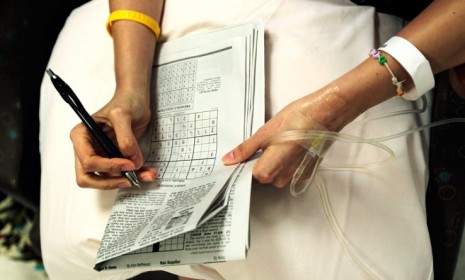Can chemotherapy make cancer worse?
Chemotherapy is one of the best known ways to kill cancer cells. Too bad it sometimes turns neighboring healthy cells into tumor-growing agents

A free daily email with the biggest news stories of the day – and the best features from TheWeek.com
You are now subscribed
Your newsletter sign-up was successful
Chemotherapy is the last chance for many cancer survivors, but researchers in Seattle just made what they call a "completely unexpected" discovery that suggests the go-to cancer treatment is a double-edged sword. If Peter Nelson and his colleagues at the Fred Hutchinson Cancer Research Center are right, chemotherapy could actually help some cancers survive, grow faster, and resist treatment. Does chemotherapy actually undermine itself? Here's a look at the surprising findings:
What did the researchers find?
Nelson and his team were trying to explain why cancer is so resilient in the body, yet so easy to kill in the lab, and realized that the culprit is the interaction of chemotherapy and healthy cells surrounding the targeted tumors. When used on cancer, chemotherapy slows or stops the reproduction of rapidly dividing cells found in tumors, but the new research shows it also damages the DNA of neighboring fibroblast cells, which normally help heal wounds. Once hit by the chemo, the fibroblast cells churn out 30 times more of a protein called WNT16B than normal. The WNT16B fuels the resurgence of the targeted tumors and inhibits further chemotherapy treatments, the researchers say.
The Week
Escape your echo chamber. Get the facts behind the news, plus analysis from multiple perspectives.

Sign up for The Week's Free Newsletters
From our morning news briefing to a weekly Good News Newsletter, get the best of The Week delivered directly to your inbox.
From our morning news briefing to a weekly Good News Newsletter, get the best of The Week delivered directly to your inbox.
This was a surprise?
"The increase in WNT16B was completely unexpected," Nelson tells AFP, but the effect wasn't. About 90 percent of patients with certain cancers — breast, prostate, lung, and colon — develop a resistance to chemotherapy. The new research, presented in the journal Nature Medicine, is the first to finger chemotherapy's poisoning healthy fibroblast cells as the possible culprit in keeping the cancer alive and well.
Is this bad news?
Not necessarily. It could even realistically improve cancer treatment going forward, Nelson tells AFP. "For example, an antibody to WNT16B, given with chemotherapy, may improve responses (kill more tumor cells)," or else let oncologists use "smaller, less toxic doses of therapy" on patients. Fran Balkwill, a British cancer expert, tells BBC News that the study helpfully confirms that chemotherapy affects surrounding healthy cells — for good and for bad. "The next step is to find ways to target these resistance mechanisms to help make chemotherapy more effective."
A free daily email with the biggest news stories of the day – and the best features from TheWeek.com
Sources: AFP, BBC News, Daily Mail, International Business Times


